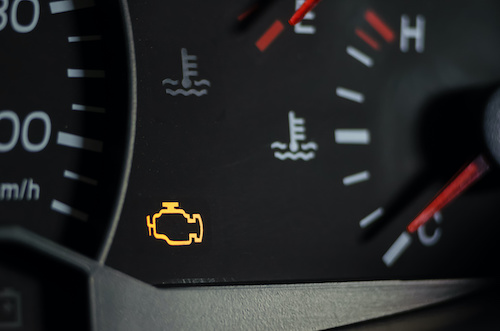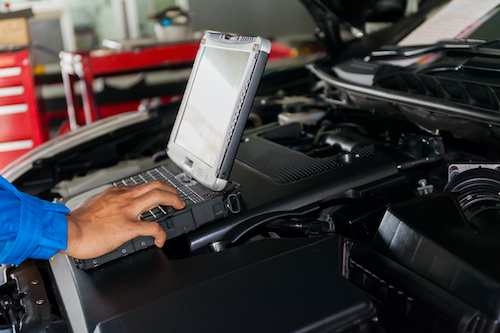Most people have seen the check engine light in their vehicle come on. Some people react by immediately halting their driving and taking it to an auto shop urgently. Others will drive with the light on for hundreds of miles before getting it checked. There are thousands of reasons why the check engine light could come on, but we’ve discussed the top five reasons we see at our shop.
Catalytic Converter
Catalytic converter damage is common in older vehicles. If proper maintenance to the catalytic converter wasn’t completed, then a number of things could go wrong with it and the check engine light will illuminate as a result. Sometimes the precious metals inside the catalytic converter will break down and can’t clean up the emissions like it’s supposed to.
Oxygen Sensors
Your vehicle has sensors around the exhaust system. Some vehicles even have up to six sensors. These sensors monitor the amount of oxygen coming out of the exhaust system to ensure everything is working properly. Over time with heat and water exposure, these sensors can fail and prompt the check engine light to turn on.
Ignition System
I f you have a faulty spark plug, the check engine light will come on. This might not seem like a big deal and a DIY mechanic might continue driving for a while before getting their vehicle checked by a professional. The problem is this faulty spark plug could be leading to damage to the ignition coil, which is a much larger problem. It’s always best and easiest to replace a spark plug before it causes additional damage to your vehicle.
f you have a faulty spark plug, the check engine light will come on. This might not seem like a big deal and a DIY mechanic might continue driving for a while before getting their vehicle checked by a professional. The problem is this faulty spark plug could be leading to damage to the ignition coil, which is a much larger problem. It’s always best and easiest to replace a spark plug before it causes additional damage to your vehicle.
Gas Cap Is Not On
Believe it or not, if the gas cap is not secured properly after filling up with gas, the check engine light will come on. Rust in the evaporation system can also prompt a check engine light to illuminate. Rust is common in our area because of the amount of salt used on the roads during the winter so always be aware of rust issues with your vehicle.
Mass Airflow Sensor
The mass airflow sensor measures how much air the engine is breathing in. This sensor is on the front of the vehicle, so it’s exposed to a lot of dirt, debris, moisture, and other contaminants. All of these can cause a failure in the electric components of the sensor and your check engine light will come on as a result.
While sometimes your check engine light could be as simple as tightening your gas cap to fix the problem, other times it can be a little more technical. DeBoer’s Auto can give you peace of mind and clear your check engine light for you with ease. For other tips or advice, don’t hesitate to contact us at any time.








